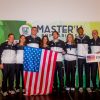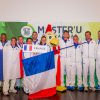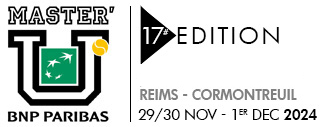
 The Master'U BNP Paribas allows eight university tennis teams to meet for a weekend. More than an international meeting,different philosophies are opposed. Illustration with France and United States of America.
France welcomes, the United States win. This is how to summarize the recent history of the Master'U. The five-time tenants of the title are again the favorites. Like his teammates, Christopher Eubanks benefits from a university system favorable to athletes. The Team USA player trains twenty hours a week on the Georgia Tech campus. The rest of his week he is in the amphitheatres or in competition. "Colleges" support their aligned students in both national and international competitions. "In NCAA or on the WTA circuit, my faculty pays my travel, a coach and a physiotherapist," said American player Francesca Di Lorenzo, a student in Ohio State and 348th in the world. That is precisely why Marine Partaud refused "a million American opportunities". If all the fees are paid, the winnings must be refunded, specifies the French. Because in the country of Uncle Sam, student rhyme with no professional status and therefore few opportunities to shine on the WTA circuit. That did not cool the Irish Jane Fennelly. She crossed the Atlantic to join the University of Notre Dame in Indiana to study marketing, but especially to progress in tennis: "It was a mutual interest that resulted in an excellent opportunity as well the school plan Sports, "she says. A choice that the native of the suburbs of Dublin does not regret. "The American model is much more competitive, with a lot of resources. "It must be said that the stakes are high. For Melissa Schaub, American coach, "the university team is the emblem of a city and sometimes even of a state. "
The Master'U BNP Paribas allows eight university tennis teams to meet for a weekend. More than an international meeting,different philosophies are opposed. Illustration with France and United States of America.
France welcomes, the United States win. This is how to summarize the recent history of the Master'U. The five-time tenants of the title are again the favorites. Like his teammates, Christopher Eubanks benefits from a university system favorable to athletes. The Team USA player trains twenty hours a week on the Georgia Tech campus. The rest of his week he is in the amphitheatres or in competition. "Colleges" support their aligned students in both national and international competitions. "In NCAA or on the WTA circuit, my faculty pays my travel, a coach and a physiotherapist," said American player Francesca Di Lorenzo, a student in Ohio State and 348th in the world. That is precisely why Marine Partaud refused "a million American opportunities". If all the fees are paid, the winnings must be refunded, specifies the French. Because in the country of Uncle Sam, student rhyme with no professional status and therefore few opportunities to shine on the WTA circuit. That did not cool the Irish Jane Fennelly. She crossed the Atlantic to join the University of Notre Dame in Indiana to study marketing, but especially to progress in tennis: "It was a mutual interest that resulted in an excellent opportunity as well the school plan Sports, "she says. A choice that the native of the suburbs of Dublin does not regret. "The American model is much more competitive, with a lot of resources. "It must be said that the stakes are high. For Melissa Schaub, American coach, "the university team is the emblem of a city and sometimes even of a state. "
Investments and Competition
In the United States of America, the competitions are divided into two periods and end in May with the national championship. The opportunity for the 64 best American universities to cross the iron before several hundred spectators. Some institutions do not hesitate to invest several hundred thousand dollars to triumph. Well helped by former students who have succeeded and want to contribute to the radiance of their place of formation. A philosophy not shared by Jean-François Sautereau. "We want to train men before training athletes," says the President of the French sport university federation (FFSU). A training that allows high-level athletes to train can take place remotely. Alice Bacquie, registered at the University of Toulouse Jean Jaurès, studies from her home in Bordeaux. She attends all classes at home and moves at the end of semester for partials. The marks are as important as the sports performance. The sport will never take the upper hand on studies in French higher education. Jean-François Sautereau confirms, "It's like recruiting a student who does not have the bac only because of his sporting qualities. It is unthinkable and I forbid it. It is not desirable to adopt the American model. "

 The Master'U BNP Paribas allows eight university tennis teams to meet for a weekend. More than an international meeting,different philosophies are opposed. Illustration with France and United States of America.
France welcomes, the United States win. This is how to summarize the recent history of the Master'U. The five-time tenants of the title are again the favorites. Like his teammates, Christopher Eubanks benefits from a university system favorable to athletes. The Team USA player trains twenty hours a week on the Georgia Tech campus. The rest of his week he is in the amphitheatres or in competition. "Colleges" support their aligned students in both national and international competitions. "In NCAA or on the WTA circuit, my faculty pays my travel, a coach and a physiotherapist," said American player Francesca Di Lorenzo, a student in Ohio State and 348th in the world. That is precisely why Marine Partaud refused "a million American opportunities". If all the fees are paid, the winnings must be refunded, specifies the French. Because in the country of Uncle Sam, student rhyme with no professional status and therefore few opportunities to shine on the WTA circuit. That did not cool the Irish Jane Fennelly. She crossed the Atlantic to join the University of Notre Dame in Indiana to study marketing, but especially to progress in tennis: "It was a mutual interest that resulted in an excellent opportunity as well the school plan Sports, "she says. A choice that the native of the suburbs of Dublin does not regret. "The American model is much more competitive, with a lot of resources. "It must be said that the stakes are high. For Melissa Schaub, American coach, "the university team is the emblem of a city and sometimes even of a state. "
The Master'U BNP Paribas allows eight university tennis teams to meet for a weekend. More than an international meeting,different philosophies are opposed. Illustration with France and United States of America.
France welcomes, the United States win. This is how to summarize the recent history of the Master'U. The five-time tenants of the title are again the favorites. Like his teammates, Christopher Eubanks benefits from a university system favorable to athletes. The Team USA player trains twenty hours a week on the Georgia Tech campus. The rest of his week he is in the amphitheatres or in competition. "Colleges" support their aligned students in both national and international competitions. "In NCAA or on the WTA circuit, my faculty pays my travel, a coach and a physiotherapist," said American player Francesca Di Lorenzo, a student in Ohio State and 348th in the world. That is precisely why Marine Partaud refused "a million American opportunities". If all the fees are paid, the winnings must be refunded, specifies the French. Because in the country of Uncle Sam, student rhyme with no professional status and therefore few opportunities to shine on the WTA circuit. That did not cool the Irish Jane Fennelly. She crossed the Atlantic to join the University of Notre Dame in Indiana to study marketing, but especially to progress in tennis: "It was a mutual interest that resulted in an excellent opportunity as well the school plan Sports, "she says. A choice that the native of the suburbs of Dublin does not regret. "The American model is much more competitive, with a lot of resources. "It must be said that the stakes are high. For Melissa Schaub, American coach, "the university team is the emblem of a city and sometimes even of a state. "





 The Master'U BNP Paribas allows eight university tennis teams to meet for a weekend. More than an international meeting,different philosophies are opposed. Illustration with France and United States of America.
France welcomes, the United States win. This is how to summarize the recent history of the Master'U. The five-time tenants of the title are again the favorites. Like his teammates, Christopher Eubanks benefits from a university system favorable to athletes. The Team USA player trains twenty hours a week on the Georgia Tech campus. The rest of his week he is in the amphitheatres or in competition. "Colleges" support their aligned students in both national and international competitions. "In NCAA or on the WTA circuit, my faculty pays my travel, a coach and a physiotherapist," said American player Francesca Di Lorenzo, a student in Ohio State and 348th in the world. That is precisely why Marine Partaud refused "a million American opportunities". If all the fees are paid, the winnings must be refunded, specifies the French. Because in the country of Uncle Sam, student rhyme with no professional status and therefore few opportunities to shine on the WTA circuit. That did not cool the Irish Jane Fennelly. She crossed the Atlantic to join the University of Notre Dame in Indiana to study marketing, but especially to progress in tennis: "It was a mutual interest that resulted in an excellent opportunity as well the school plan Sports, "she says. A choice that the native of the suburbs of Dublin does not regret. "The American model is much more competitive, with a lot of resources. "It must be said that the stakes are high. For Melissa Schaub, American coach, "the university team is the emblem of a city and sometimes even of a state. "
The Master'U BNP Paribas allows eight university tennis teams to meet for a weekend. More than an international meeting,different philosophies are opposed. Illustration with France and United States of America.
France welcomes, the United States win. This is how to summarize the recent history of the Master'U. The five-time tenants of the title are again the favorites. Like his teammates, Christopher Eubanks benefits from a university system favorable to athletes. The Team USA player trains twenty hours a week on the Georgia Tech campus. The rest of his week he is in the amphitheatres or in competition. "Colleges" support their aligned students in both national and international competitions. "In NCAA or on the WTA circuit, my faculty pays my travel, a coach and a physiotherapist," said American player Francesca Di Lorenzo, a student in Ohio State and 348th in the world. That is precisely why Marine Partaud refused "a million American opportunities". If all the fees are paid, the winnings must be refunded, specifies the French. Because in the country of Uncle Sam, student rhyme with no professional status and therefore few opportunities to shine on the WTA circuit. That did not cool the Irish Jane Fennelly. She crossed the Atlantic to join the University of Notre Dame in Indiana to study marketing, but especially to progress in tennis: "It was a mutual interest that resulted in an excellent opportunity as well the school plan Sports, "she says. A choice that the native of the suburbs of Dublin does not regret. "The American model is much more competitive, with a lot of resources. "It must be said that the stakes are high. For Melissa Schaub, American coach, "the university team is the emblem of a city and sometimes even of a state. "